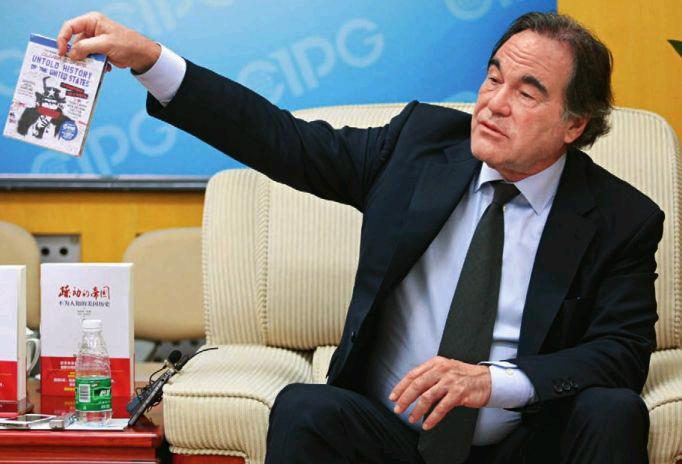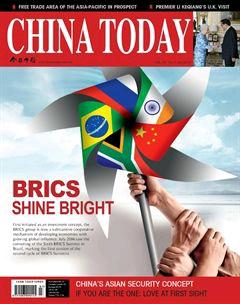Oliver Stone:Know the Past and Show the Present
By+staff+reporter+XING+WEN
Know Your Past
Oliver Stone has achieved fame and respect for writing and directing powerful films. Having enlisted in the U.S. army for combat duty in Vietnam, Stone initially served in the infantry and later the cavalry division. His first screen success was the 12-minute film Last Year in Viet Nam. Though many people in power did not agree with his views on Vietnam, as expressed in Platoon (1986), Born on the Fourth of July (1989), and Heaven & Earth (1993), this in no way hampered critical acclaim of Stones films.
Over the decades, Stones films have also tackled contemporary, controversial, political, and cultural issues. They include JFK (1991), Natural Born Killers(1994), and Nixon (1995). “My films are too realistic and so are often criticized,” Stone said. “Dealing with history in movies is always difficult, even in my country, because views on it are so diverse.”
In Stones eyes, history is always a battleground. But this veteran filmmaker is always prepared. In 2008, Stone took a course in American History at New York University in preparation for his documentary The Untold History of the United States.
“2008 was the last year of U.S. President George W. Bushs second term. His actions during the eightyear Bush administration prompted me to determine if Bush was an aberration, or if his policy was a continuation of foreign and domestic policy in American history,” Stone said. Working with Peter J. Kuznick, a historian at the American University, Stone decided to tell the “dark side” of American history, “Not the one weve learnt in school,” the director added.
Stone found that, in spite of having been on the winning side of WWII, the U.S. emerged from it paranoid and fearful rather than more confident. Its Cold War posture and containment policy rendered the U.S. a national security state. Even after the fall of the Soviet Union, the U.S. expanded state security to a state of global security.
“It is now imposed on everyone, everywhere in the world,” Stone said. He believes this posture creates disharmony and intensifies world tension, to the extent that it “threatens the worlds prosperity.”
In his documentary Stone criticizes U.S. reactions to certain events. In his view, the U.S. made even more enemies in the aftermath of 9/11 as a result of President Bushs over-reaction to it, manifest in making this event the cornerstone of the war on terror, which persists to this day. Stone also describes U.S. sanctions against Russia as a result of its actions in Ukraine as “unbelievable, and another echo of WWII,” because it brings the world to the brink of an all too possible tragedy.“We didnt learn anything from WWII,” is Stones gloomy conclusion.
Stone believes that you can either go through life not knowing anything about your past or make the decision to know something. He wants to know his past as an American, and to make it known to more people. The 10-episode documentary series The Untold History of the United States was broadcast in the U.S. in 2013, and has been televised in many countries in Europe and Asia since. During his April visit to Beijing, Stone reached an agreement with Foreign Languages Press to release the DVD in China. Chongqing Publishing House published the Chinese edition of the accompanying book in February, 2014.
“I hope to share it with the next generation of young Chinese people who are open-minded enough to study American history this way. It would be good for young people to see and learn from this series,”Stone said.
China and Hollywood
Having completed his “journey to the heart of darkness” with The Untold History of the United States, Stone is currently focusing on two co-productions with Chinese filmmakers. “I love Chinese films that are specific to China, and feel drawn to those that say and teach me something about Chinese culture.”
He is hence participating in the co-production of The Art of War. Still in its early stages, the film is adapted from the works of Chinese strategist and philosopher Sun Tzu. Stone has long appreciated Sun Tzus theories on retreat and surrender, as manifest in the philosophical quote, “If you always try to be number one, you make many enemies.”
“I think this is important for everyone to learn, because we sometimes tend to bully others in the belief that we have to be the best and strongest,” Stone said. He hopes this movie will show people that the art of war is to avoid war.
Earlier this year, Stone went to Inner Mongolia Autonomous Region with Chinese director Mai Lisi to shoot another co-produced movie Genghis Khans Treasures, a story that spans the 13th century Mongol Yuan Dynasty to the contemporary computer age. He was fascinated to discover that the Mongol Empire constituted a great example of how to live in harmony. “Genghis Khans empire, although built on blood and conquest, was one of the most harmonious, in the sense of being tolerant,” Stone said.
An aficionado of Chinese and Asian films, Stone hopes Western cinema-goers will through co-produced movies come to understand China better. “Coproductions should be based on good ideas, because when motivated solely by profits they can often be awkward,” Stone said.
He went on to reveal stories about the relationships between China and the U.S. that have not yet been told, including some that occurred during WWII which should be filmed. “It is important to remind people of the old tradition up until 1949 of Americans in China, and that China and the U.S. were allies against Japan in WWII. People forget these things, so we must keep bringing history to young people through film, documentaries and books,” Stone said. His emphasis is on staying real –the more we deal with real history, the better our coproductions will be.
Stone spoke of Chinese filmmakers venturing into the Western film industry. In his opinion, there are certain things that Chinese filmmakers do better than Hollywood. “You change styles over the years, and have created new approaches that inspire the West. The forces of physical and mental energy are beautifully expressed through balletic, graceful Chinese acrobatics.” Martial arts movies by Runrun Shaw are beautiful in his eyes, while Shaolin Soccer and Kungfu Hustle by Stephen Chow Sing-Chi are clever and slick. “Smart- ness is apparent in Chinese film,” Stone said.
Although complimentary about the way Chinese filmmakers take on the classics and portray the past, Stones advice to Chinese filmmakers is to engage with more modern themes. “Your story over the past 50 years is certainly contentious but more fascinating than anywhere else,” Stone said.
Today, more Chinese actors and actresses are endeavoring to make their entrances onto the global stage. Zhang Ziyi, Gong Li, Yu Nan and many more have embarked on Hollywood careers. But, as Stone pointed out, “in the West, Westerners still prefer to see Westerners” – a bias that Asian actors must face, although he believes a similar one exists in China about Westerners.
Stone believes that including international actors in Chinese productions makes sense, for realisms sake, other than in action or adventure movies. The best way to bring the two sides together, according to Stone, is through love stories. “Stories like Love Is a Many-Splendored Thing are classic, because they bring people together and are a way of presenting the values of different cultures,” Stone said.
Stone raised the matter of language as another difficulty of co-productions. “As a director, how can I fully understand the nuances of actors performances when they speak a different language? I wouldnt have any idea were it not for the translator.” Stone considers Chinese actress Chen Chong as a superb although rare example of bilingual skills. “She is one of the best Chinese actors I have worked with. She understands American idioms and is at the same time inured in Chinese culture.” Stone suggested that excellence in English would give Chinese actors chasing their Hollywood dream an edge over the rest.

